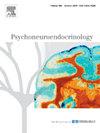Chronic stress induces depression-like behavior in rats through affecting brain mitochondrial function and inflammation
IF 3.4
2区 医学
Q2 ENDOCRINOLOGY & METABOLISM
引用次数: 0
Abstract
Chronic stress is involved in pathophysiology of depression, and causes some neurochemical alterations in brain. Both mitochondrial dysfunction and neuroinflammation are implicated in mediating the depression-like behavior. The objectives of present study were, at first, to confirm that chronic unpredictable mild stress (CUMS) induces depression-like behavior and alters mitochondrial function and inflammatory responses within the brain, and then to explore the role of mitochondria in the development of this depression-like behavior. It has been found that CUMS exposure induced depression-like behavior, mitochondrial dysfunction, increased IL-1, IL-6, IFN-γ and TNF-α levels in hippocampus and PFC. Moreover, the level of ATP, the key index of mitochondrial function, was inversely correlated with the levels of proinflammatory cytokine. Intracerebroventricular (ICV) injection of the mitochondrial targeted antioxidant MnTBAP significantly alleviated depression-like behavior in CUMS group. These findings suggested that CUMS results in depression-like behavior, mitochondrial dysfunction as well as neuroinflammation, and mitochondria dysfunction contributes to depression-like behavior caused by CUMS.
慢性应激通过影响脑线粒体功能和炎症诱导大鼠抑郁样行为。
慢性压力与抑郁症的病理生理有关,并引起大脑的一些神经化学改变。线粒体功能障碍和神经炎症都与介导抑郁样行为有关。本研究的目的是,首先确认慢性不可预测的轻度应激(CUMS)诱导抑郁样行为并改变脑内线粒体功能和炎症反应,然后探索线粒体在这种抑郁样行为发展中的作用。研究发现,CUMS暴露导致抑郁样行为、线粒体功能障碍,海马和pfc中IL-1、IL-6、IFN-γ和TNF-α水平升高,线粒体功能的关键指标ATP水平与促炎细胞因子水平呈负相关。脑室内注射线粒体靶向抗氧化剂MnTBAP可显著缓解CUMS组抑郁样行为。这些发现表明,CUMS导致抑郁样行为、线粒体功能障碍和神经炎症,线粒体功能障碍有助于CUMS引起的抑郁样行为。
本文章由计算机程序翻译,如有差异,请以英文原文为准。
求助全文
约1分钟内获得全文
求助全文
来源期刊

Psychoneuroendocrinology
医学-精神病学
CiteScore
7.40
自引率
8.10%
发文量
268
审稿时长
66 days
期刊介绍:
Psychoneuroendocrinology publishes papers dealing with the interrelated disciplines of psychology, neurobiology, endocrinology, immunology, neurology, and psychiatry, with an emphasis on multidisciplinary studies aiming at integrating these disciplines in terms of either basic research or clinical implications. One of the main goals is to understand how a variety of psychobiological factors interact in the expression of the stress response as it relates to the development and/or maintenance of neuropsychiatric illnesses.
 求助内容:
求助内容: 应助结果提醒方式:
应助结果提醒方式:


